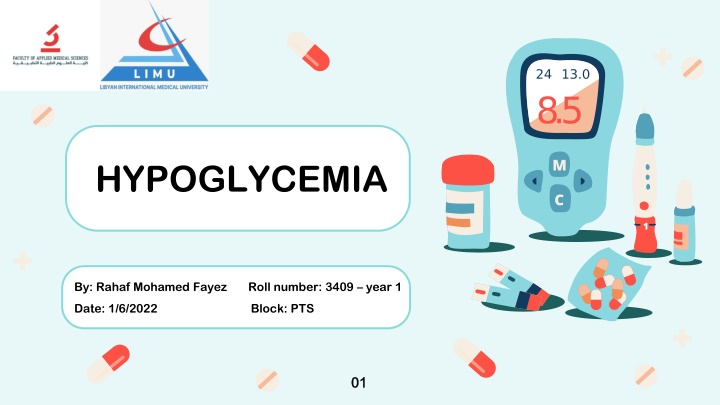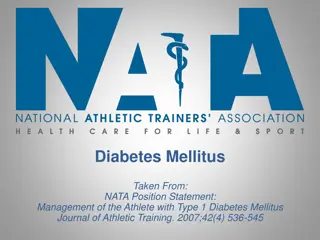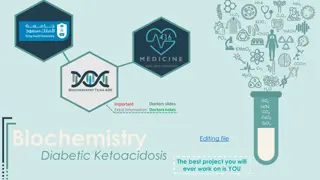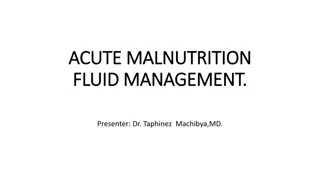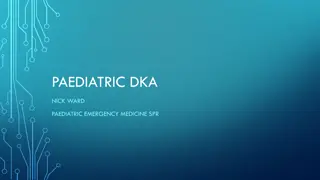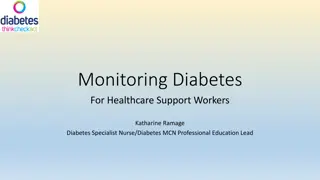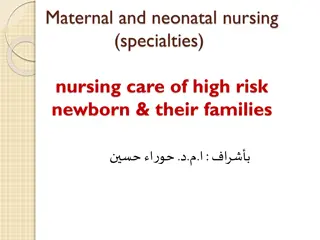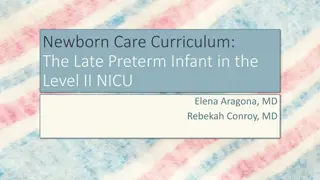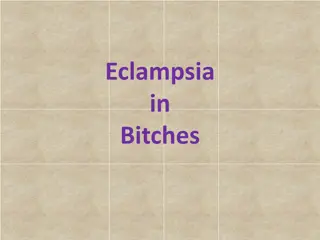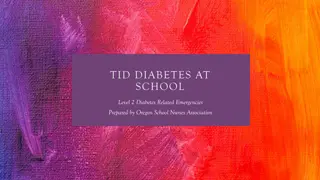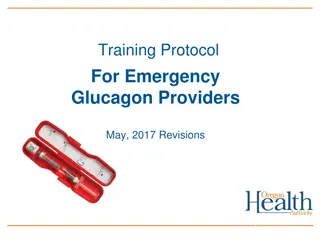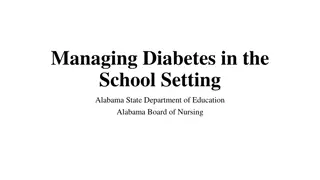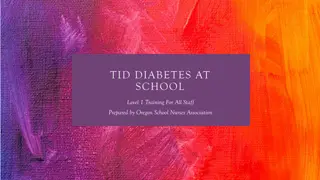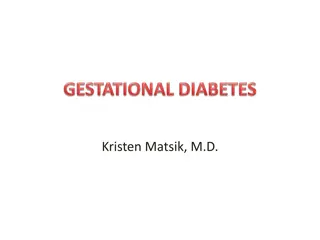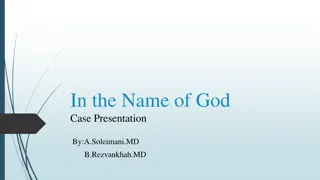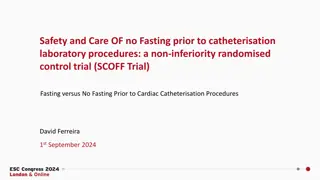HYPOGLYCEMIA
Hypoglycemia, or low blood sugar, can lead to various symptoms and complications. Learn about its causes, ways to prevent it, and treatments available. Explore the risks associated with hypoglycemia unawareness.
Download Presentation

Please find below an Image/Link to download the presentation.
The content on the website is provided AS IS for your information and personal use only. It may not be sold, licensed, or shared on other websites without obtaining consent from the author.If you encounter any issues during the download, it is possible that the publisher has removed the file from their server.
You are allowed to download the files provided on this website for personal or commercial use, subject to the condition that they are used lawfully. All files are the property of their respective owners.
The content on the website is provided AS IS for your information and personal use only. It may not be sold, licensed, or shared on other websites without obtaining consent from the author.
E N D
Presentation Transcript
HYPOGLYCEMIA By: Rahaf Mohamed Fayez Roll number: 3409 year 1 Date: 1/6/2022 Block: PTS 01 01
OBJECTIVES List symptoms and complications of hypoglycemia. Outline causes of hypoglycemia. List ways to prevent hypoglycemia. Discuss hypoglycemia unawareness. Discuss treatments of hypoglycemia. 02 02
INTRODUCTION WHAT IS HYPOGLYCEMIA? WHAT IS HYPOGLYCEMIA? Hypoglycemia, also known as low blood sugar or low blood glucose, is a condition that occurs when the level of glucose in your blood drops below the healthy range. For many people with diabetes, this means a blood glucose reading lower than 70 milligrams per deciliter. 03 03
1. SYMPTOMS AND COMPLICATIONS OF HYPOGLYCEMIA Mild-to-moderate symptoms Severe symptoms Shakiness Hunger Exhaustion Dizziness, confusion and irritability Fast or unsteady heart beat Headache Unclear vision or speech Loss of consciousness Seizures or convulsions 04 04
1. SYMPTOMS AND COMPLICATIONS OF HYPOGLYCEMIA C Complications: omplications: S Severely low blood glucose can cause serious complications, including passing out, coma, or death. If hypoglycemia is not treated fast enough it could cause irreversible brain damage. 05 05
2. CAUSES OF HYPOGLYCEMIA Possible causes with diabetes: Possible causes with diabetes: Diabetes type 1: Diabetes type 1: people with type 1 diabetes don t produce insulin so they need to take insulin injections. Diabetes type 2: Diabetes type 2: people with type 2 diabetes are less responsive to insulin so they might need to take insulin or other medications. But taking too much insulin or other medications may cause your blood sugar to drop too much causing hypoglycemia. 06 06
2. CAUSES OF HYPOGLYCEMIA Possible causes without diabetes: Possible causes without diabetes: Medications: Medications: some medications can cause hypoglycemia especially in children or people with kidney failure. Eg: Qualaquin, used to treat malaria. Excessive alcohol drinking: Excessive alcohol drinking: drinking too much alcohol without eating can prevent the liver from releasing glucose from its glycogen stores into the blood stream. S Some critical illnesses: ome critical illnesses: severe liver illnesses such as hepatitis, kidney disease, severe infection, advanced heart disease. 07 07
2. CAUSES OF HYPOGLYCEMIA Possible causes without diabetes: Possible causes without diabetes: Overproduction of insulin: Overproduction of insulin: a rare tumor in pancreas can cause production of too much insulin. Hormone deficienies: Hormone deficienies: certain adrenal gland and pituitary gland disorders can result in an inadequate amounts of certain hormones that regulate the glucose production or metabolism. Long Long- -term starvation: term starvation: hypoglycemia can occur with malnutrition and starvation as the glycogen stores the body needs to create glucose are used up. 08 08
3. WAYS TO PREVENT HYPOGLYCEMIA Eat at least three evenly spaced meals with in-between snacks everyday. Monitor your blood glucose level with either blood glucose meter or CGM. Be safe during exercise or physical activity by eating before or after physical activity. Take all the medications exactly as prescribed. 09 09
4. HYPOGLYCEMIA UNAWARENESS W WHAT IS HYPOGLYCEMIA UNAWARENESS? HAT IS HYPOGLYCEMIA UNAWARENESS? Hypoglycemia unawareness occurs when someone doesn t experience or perceive the symptoms of hypoglycemia, which typically occur when blood sugar falls below 54 mg/dl. Studies show that those with hypoglycemia unawareness are at much higher risk for experiencing severe hypoglycemia because they are less likely to recognize early alert signs, such as shakiness, hunger and dizziness. 10 10
5. TREATMENT OF HYPOGLYCEMIA The 15 The 15- -15 Rule : 15 Rule : Have 15 grams of carbohydrate to raise your blood glucose and check it after 15 minutes. If it s still below 70 mg/dL, have another serving. Repeat these steps until your blood glucose is at least 70 mg/dL. Once your blood glucose is back to normal, eat a meal or snack to make sure it doesn t lower again. 11 11
5. TREATMENT OF HYPOGLYCEMIA If you find an unconscious person due to If you find an unconscious person due to hypoglycemia: hypoglycemia: Place the person in the recovery position If glucagon is available and you know how to give it, then give it right away. If glucagon is unavailable call an ambulance. Do not give them anything by mouth as they can choke. 12 12
CONCLUSION Symptoms of hypoglycemia should be known and you should test yourself if you suffer from any of them. If not treated hypoglycemia can be quite dangerous and may lead to death. Hypoglycemic people should know how to deal with their condition by following the doctor s instructions. Every hypoglycemic person should own a blood glucose meter or CGM. Healthy people should learn how to save an unconscious hypoglycemic person. 13 13
REFERENCE (Hypoglycemia), L. and Health, N., 2022. Low Blood Glucose (Hypoglycemia) | NIDDK. [online] National Institute of Diabetes and Digestive and Kidney Diseases. Available at: <https://www.niddk.nih.gov/health-information/diabetes/overview/preventing-problems/low- blood-glucose-hypoglycemia#whatis> [Accessed 4 June 2022]. Mayo Clinic. 2022. Hypoglycemia - Symptoms and causes. [online] Available at: <https://www.mayoclinic.org/diseases-conditions/hypoglycemia/symptoms-causes/syc-20373685> [Accessed 4 June 2022]. Diabetes.org. 2022. Hypoglycemia (Low Blood Glucose) | ADA. [online] Available at: <https://www.diabetes.org/healthy-living/medication-treatments/blood-glucose-testing-and- control/hypoglycemia> [Accessed 4 June 2022]. Site designed and developed bka interactive ltd, N., 2022. Health Navigator New Zealand. [online] Health Navigator New Zealand. Available at: <https://www.healthnavigator.org.nz/search/#stq=hypoglycemia%20&stp=1> [Accessed 4 June 2022].
THANK YOU FOR YOUR ATTENTION!
